The recent lambasting of the Emmy awards by actress Regina King of 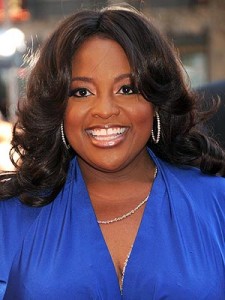 Southland and The Boondocks in a Huffington Post editorial has once again questioned the veracity of Hollywood’s willingness to acknowledge the contributions of African-American actors. In Mo’Kelly’s recent interview with comedienne and actress Sherri Shepherd of The View and now The Newlywed Game, Shepherd took it one step further; questioning Hollywood’s desire to even create programming featuring African-Americans or storylines of “Black love.”
Southland and The Boondocks in a Huffington Post editorial has once again questioned the veracity of Hollywood’s willingness to acknowledge the contributions of African-American actors. In Mo’Kelly’s recent interview with comedienne and actress Sherri Shepherd of The View and now The Newlywed Game, Shepherd took it one step further; questioning Hollywood’s desire to even create programming featuring African-Americans or storylines of “Black love.”
I applaud my Sister (Regina King), because she’s absolutely right. I think if you look at television now, it’s just we don’t have very many shows with Black leads. I mean, even my sitcom–I had a sitcom called Sherri which was out last year–and it got cancelled.
No matter, even with the fact that we raised the network’s African-American audience by 400%, they didn’t care. I absolutely agree with her. I’m not into the Oscar and Emmys as much as I used to be because I’m tired of looking at people who don’t look like me.
– Sherri Shepherd
It’s the age-old debate as to whether networks have been irresponsible in servicing non-white viewers or if there is even a “responsibility” at all. In more concrete terms, Nielsen announced earlier this month that 40% of new U.S. TV homes will be Hispanic households. Yet, even with this increase, African-American television households and total viewership still eclipses all
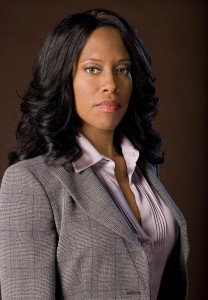
other minority groups, with approximately 12% and 20% respectively. The latter (total viewership) is the highest of any specific ethnic group, Whites included.
It is a legitimate question, how is Hollywood best served by ignoring the largest television-watching market segment per household?
It isn’t.
If this is about Hollywood’s bottom line, basic business sense requires meeting the demand with some sort of supply.
The remarks of King or Shepherd regarding Hollywood’s supposed deficiencies are anything but a Black and White discussion…pun intended. It’s a much more nuanced debate and often times its fullness is overlooked or ignored altogether. The conversation is not merely a matter of having more Black faces on television. The conversation is not simply a statistical analysis of the number of Emmy nominations handed out to Black actors versus non-Black. It’s deeper and more complex than simply a “Black headcount.” To limit the discussion to such parameters misses the point and best explains how Hollywood historically has missed it too.
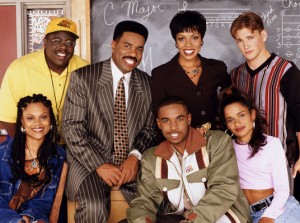
In the mid 90s, the WB network in its efforts to increase diversity offered a slew of comedies with African-American leads; The Jamie Foxx Show, The Wayans Brothers, The Steve Harvey Show, The Parent ‘Hood, and Sister, Sister.
Comedies, comedies and more comedies. No love stories, no dramas, no action/adventure. Just comedy.
In later years, UPN tried more of the same. An earnest attempt to be sure, as there were African-American actors who were working and forwarding their careers. Television viewers at the minimum had some sort of alternative to traditional network programming in the form of All of Us, Half and Half, One

on One and Eve,
Comedies, comedies and more comedies. No love stories, no dramas and written mostly by non-African-American writers. Even the 3-word show titles were similar. Diversity? Not really.
Next up was UPN and…you guessed it…more comedy and a fewer number at that as the Reality TV craze hit its stride.
Girlfriends, Everybody Hates Chris, …etc.
Some of the aforementioned were hit programs, some eventually reached syndication status…others not so much. But all of them were comedies.
Back to Shepherd…
She is an actress with strong comedic chops as well as mainstream acting acceptance. If she isn’t monolithic in nature, why would networks assume anyone African-American who watches television would be? Mo’Kelly’s been African-American all his life and never has his life or the lives of other African-Americans around him merely been a never-ending comedy.
I’ve been doing it for years. I’m going to support … there’s a new show with Boris Kodjoe called ‘Undercovers’ which is I believe on NBC. I believe it’s the first time you’ve got two major Black leads… romance… romantic leads.
I’m telling everybody, we must support this show. We’ve got to support this show. Because I want to see some Black love on TV. I’m tired, I’m really tired. I thank God that I’m working. And I’m one of the ones working, along with Regina King. But gosh, it would be nice to have some other folks up there.
Shepherd is right and it’s sad. Why is it do-or-die for such a program in 2010? Why, because it’s the first of its kind and if it fails it likely will be the last of its kind for a very long time.
“Black love,” action and adventure should not be novel concepts and definitely not new to television viewers in the 21st century. When Undercovers premieres this week on NBC it will be both…and that’s a sad, sad commentary on major network programming in 2010.
Kudos to NBC, thank you for joining the rest of us in the 21st century.
There’s a Black married couple in the White House who’s not cracking jokes every 3 lines, so very nice of NBC to feature another Black married couple who isn’t either.
Kudos yes, but let’s keep them in their proper context.
“Black love,” action and adventure should not be mutually exclusive and television has a responsibility to show African-Americans in something other
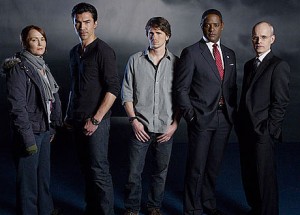
than a comedy…yes, a responsibility. The Nielsen numbers are clear, there is no excuse.
Yes, it does mean something to see Blair Underwood (The Event) or Dennis Haysbert (24) play “the President” on high-profile television shows. It helps change the perception of Black people generally and Black men specifically. Again, this is not an “either/or” proposition…but a “both/and” one.
It matters how we as African-Americans are viewed by others and how we view ourselves through the televised medium. History has shown us that television can spur enlightenment and cultural progress when it is at its best.
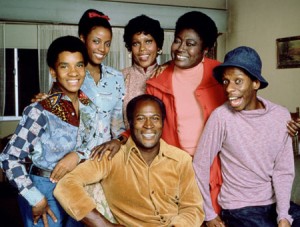
At its worst, it mires society in negative stereotypes and narrow-minded views of what (and who) is important in America.
Yes, it does mean something that African-American actors individually are appearing on shows that cater to no specific ethnic demographic segment; but that’s only half the battle. The other half is in demonstrating an appreciation of African-Americans who watch television indiscriminately, the stories which are specific to African-Americans and to Regina King’s point, respecting and celebrating all of the aforementioned accordingly.
For the full audio interview of Sherri Shepherd and her remarks on Hollywood, click HERE
The Mo’Kelly Report is an entertainment journal with a political slant; published at The Huffington Post and www.eurweb.com. It is meant to inform, infuse and incite meaningful discourse…as well as entertain. For more Mo’Kelly, https://mrmokelly.com. Mr. Mo’Kelly can be reached at [email protected]. http://twitter.com/mrmokelly
5 responses to “Sherri Shepherd: ‘I Want to See Some Black Love on TV’”
Has she learned yet that the world is not flat?
Not to be a nitpicker, but your timeline as it relates to black programming is a little off. To appreciate the total picture you have to go back to the newly formed Fox Broadcasting which discovered it had a large and loyal African-American audience watching their breakout hit Married With Children. As a result they developed a pilot In Living Color which they sat on for a year, unsure as to how the controversial material would be received. Of course it was a hit and lead to a spate of black programming on Fox such has Robert Townsend, Martin, Sinbad, etc. With their success as the 4th broadcast network secured (something never before accomplished) on the strength of the loyal black audience Fox moved on to a bigger and better audience (white people) once they acquired NFL Football and jettisoned without remorse all of it’s black programming. But, the model for success had been established. UPN launched with a slate of comedies aimed at white males. When they failed miserably Lucy Salhany president of the fledgling network took a chance on a pilot that had been passed on by CBS. That pilot was Moesha, which was an unqualified success and was quickly followed up by a deluge of African-American programming. The WB, not to be left on the sidelines, put together their slate of African-American programming, and together the two infant networks were able to survive all on the strength of the loyal African-American audience. Of course, after the merger of UPN and WB the newly formed CW decided they wanted to go after a bigger and better audience– White People. So where does that leave us? It seems Tyler Perry and TBS have been the primary benefactors of the lack of black programming on network TV. Good for them. Do I wish we had black dramas and romantic comedies? Of course. But you have to start somewhere. You may not be aware but writers and producers of such shows and movies as Soul Food, Girlfriends, Lincoln Heights, Love and Basketball all worked on those little black comedies that nobody seems to appreciate.
Funny how it’s the so called minorities who, in this “post-racial” world, are the ones putting insane emphasis on skin color.
Here’s the thing: skin color doesn’t matter. Neither does gender. The leads should be held by the best actors available, regardless of skin color or gender. But that, of course, would make sense and be intelligent and we can’t have that in today’s world, because that would mean that certain “interest groups” would lose power.
You assume that all paths to the selection of “the best actors available” are actually equal in nature. You assume that casting for television, movies and such are open calls built upon meritocracies.
You keep on assuming.
And not only that…none of us “so-called minorities” ever called this world post-racial. Only people like you. The election of President Obama renders race moot no more than did the election of Maraget Thatcher as Prime Minister render gender moot in Great Britain. You are full of assumptions aren’t you?
How cute.